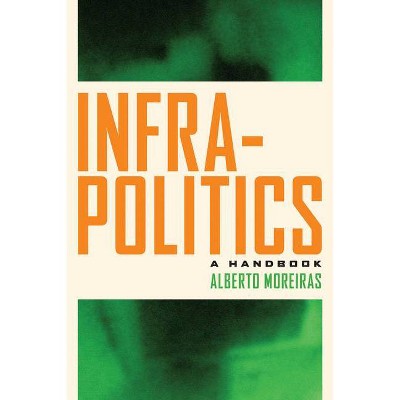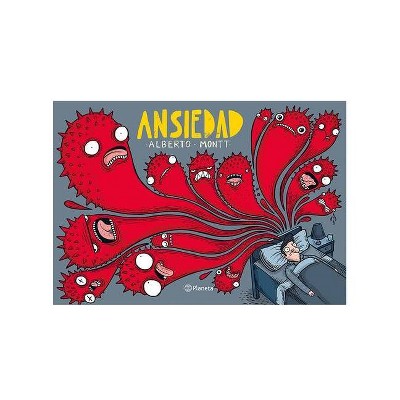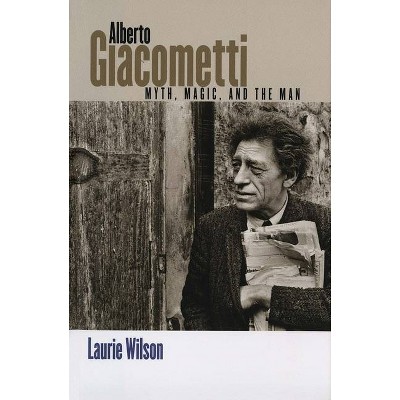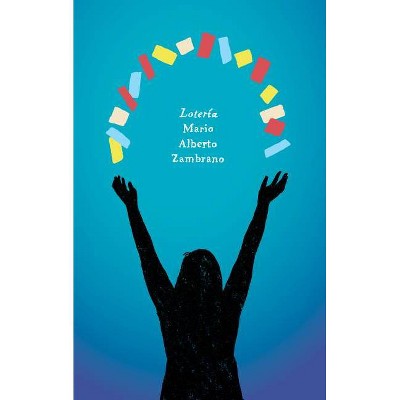Infrapolitics - by Alberto Moreiras (Paperback)

Similar Products
Products of same category from the store
AllProduct info
<p/><br></br><p><b> About the Book </b></p></br></br><i>Infrapolitics: A Handbook</i> elaborates conditions of existence that exceed any definition of world bound to political determinations. It offers a general critique of the political apparatus and seeks to establish an imperative horizon for existential self-understanding. The book provides a genealogy of infrapolitics in the context of contemporary philosophical and politico-theoretical reflection.<p/><br></br><p><b> Book Synopsis </b></p></br></br><p>The personal is not political, even if politics marks it and, in many cases, determines it. <i>Infrapolitics</i> seeks to understand conditions of existence that are not reducible to political life and that exceed any definition of world bound to political determinations. It seeks to mobilize an exteriority without which politics could only be business or administration, that is, oppression. It demands a change in seeing and an everyday practice that subtracts from political totalization in the name of a new production of desire, of a new emancipation, and of a conception of experience that can breach the general captivation of life. <p/>In this book, Alberto Moreiras describes a form of thought aiming to provide content for a form of life and to offer a new theoretical practice for concrete existence. The book provides a genealogy of the notion of infrapolitics and places it within contemporary philosophical reflection, examining its deployment in the wake of postphenomenology and deconstruction, Lacanian analysis, the principle of anarchy, and an egalitarian symbolization of social life. In doing so, Moreiras elaborates Infrapolitics as both a general critique of the political apparatus and as an imperative horizon for existential self-understanding.</p><p/><br></br><p><b> From the Back Cover </b></p></br></br><p>"Provocative and gripping. You won't look at life and politics--and the wedge in between them--in the same way again."--<b>Cristina Rivera Garza</b>, author of <i>Grieving: Dispatches from a Wounded Country</i> <p/>"Moreiras's <i>Infrapolitics</i> gives flesh and blood to a concept that subverts liberal individualism, on the one hand, and collective communitarianism--reactionary, progressivist, or communist--on the other. Infrapolitics challenges the very notion of the political, while appreciating concrete and ontic uses the ancient and modern concept once envisioned but failed to realize."--<b>Hent de Vries</b>, New York University <p/>"One of the most important books concerning contemporary thought written this century."--<b>Brett Levinson</b>, SUNY Binghamton <p/>The personal is not political, even if politics marks it and, in many cases, determines it. <i>Infrapolitics</i> seeks to understand conditions of existence that are not reducible to political life and that exceed any definition of world bound to political determinations. It seeks to mobilize an exteriority without which politics could only be business or administration, that is, oppression. It demands a change in seeing and an everyday practice that subtracts from political totalization in the name of a new production of desire, of a new emancipation, and of a conception of experience that can breach the general captivation of life. <p/>In this book, Alberto Moreiras describes a form of thought aiming to provide content for a form of life and to offer a new theoretical practice for concrete existence. The book provides a genealogy of the notion of infrapolitics and places it within contemporary philosophical reflection, examining its deployment in the wake of postphenomenology and deconstruction, Lacanian analysis, the principle of anarchy, and an egalitarian symbolization of social life. In doing so, Moreiras elaborates Infrapolitics as both a general critique of the political apparatus and as an imperative horizon for existential self-understanding. <p/><b>Alberto Moreiras</b> is Professor of Hispanic Studies at Texas A&M University.</p><p/><br></br><p><b> Review Quotes </b></p></br></br><br>Alberto Moreiras's <i>Infrapolitics: A Handbook</i> offers a timely and provocative manual, in the age-old tradition of spiritual practices and political catechisms, but with no less keen modernist intent and resolute activist gusto. The work gives further flesh and blood to a concept that subverts the available classical options and dilemmas of liberal individualism or political liberalism, on the one hand, and collective communitarianism, in both its conservative-reactionary and progressivist socialist and communist varieties, on the other. Without resorting to theologico-political or, for that matter, anarchical alternatives that likewise seek to avoid these very dichotomies, infrapolitics challenges the very notion of the political, its ontology and politics, while redirecting our understanding toward an appreciation of concrete and ontic uses the ancient and modern overarching concept once envisioned but failed to realize. Along the way, a host of new voices are added to the chorus and political theoretical canon (María Zambrano and Felipe Martínez Marzoa, to name just these two). An engagingly written manifesto written in robust and rigorous philosophical style.<b>---Hent de Vries, Paulette Goddard Professor of the Humanities, New York University & Director, School of Criticism and Theory at Cornell University, <i></i></b><br><br>One of the most important books concerning contemporary thought written this century.<b>---Brett Levinson, SUNY Binghamton, <i></i></b><br><br>Provocative and gripping. You won't look at life and politics--and the wedge in between them--in the same way again.<b>---Cristina Rivera Garza, author of Grieving: Dispatches from a Wounded Country, <i></i></b><br><p/><br></br><p><b> About the Author </b></p></br></br><b>Alberto Moreiras </b>is Professor of Hispanic Studies at Texas A&M University. He is the author of <i>The Exhaustion of Difference: The Politics of Latin American Cultural Studies</i> (Duke University Press, 2001), <i>Against Abstraction: Notes from an Ex-Latin Americanist</i> (University of Texas Press, 2020), <i>Sosiego siniestro</i> (Guillermo Escolar, 2020), and <i>Tercer espacio y otros relatos </i>(SPLASH, 2021).
Price History
Cheapest price in the interval: 30.49 on November 8, 2021
Most expensive price in the interval: 30.49 on December 20, 2021
Price Archive shows prices from various stores, lets you see history and find the cheapest. There is no actual sale on the website. For all support, inquiry and suggestion messages communication@pricearchive.us




















